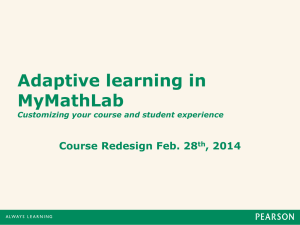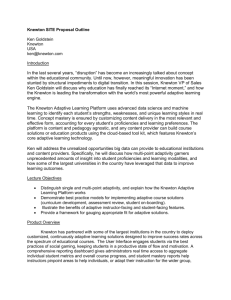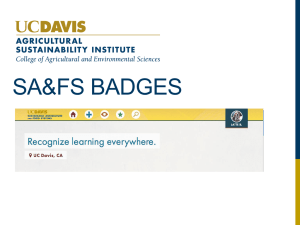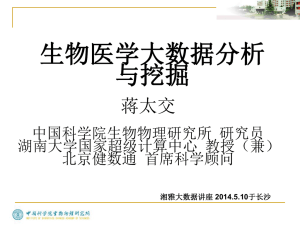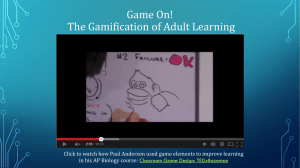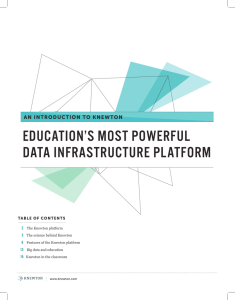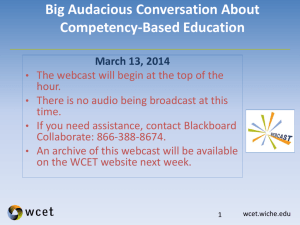WON 03 28 13 reformatted - SREB
advertisement
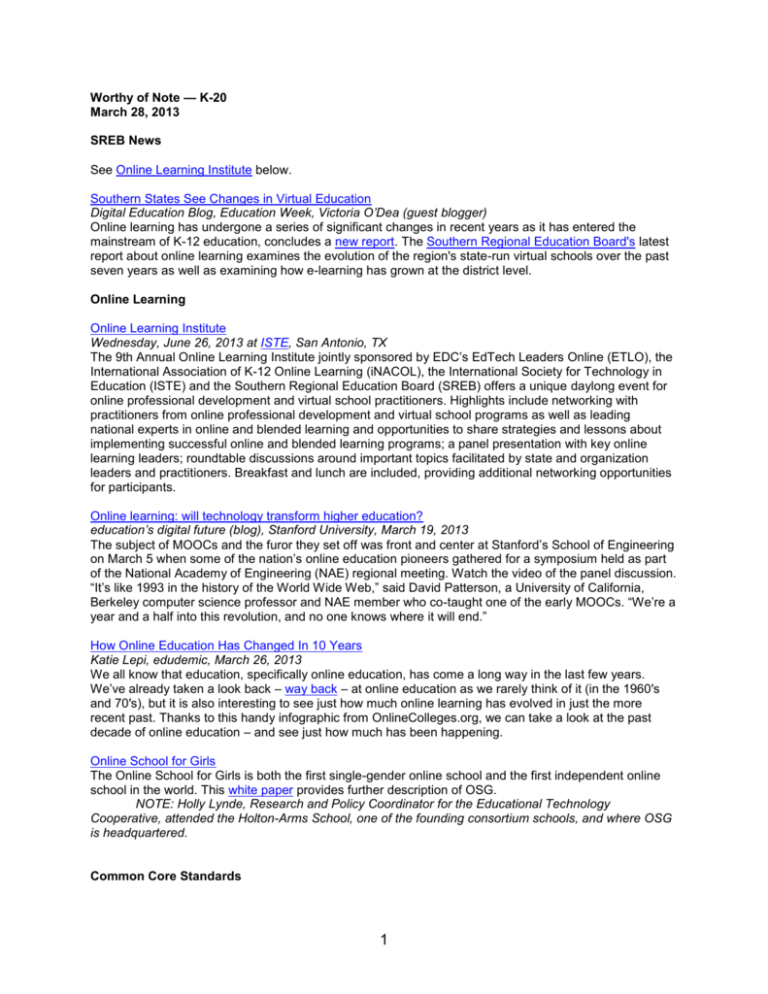
Worthy of Note — K-20 March 28, 2013 SREB News See Online Learning Institute below. Southern States See Changes in Virtual Education Digital Education Blog, Education Week, Victoria O’Dea (guest blogger) Online learning has undergone a series of significant changes in recent years as it has entered the mainstream of K-12 education, concludes a new report. The Southern Regional Education Board's latest report about online learning examines the evolution of the region's state-run virtual schools over the past seven years as well as examining how e-learning has grown at the district level. Online Learning Online Learning Institute Wednesday, June 26, 2013 at ISTE, San Antonio, TX The 9th Annual Online Learning Institute jointly sponsored by EDC’s EdTech Leaders Online (ETLO), the International Association of K-12 Online Learning (iNACOL), the International Society for Technology in Education (ISTE) and the Southern Regional Education Board (SREB) offers a unique daylong event for online professional development and virtual school practitioners. Highlights include networking with practitioners from online professional development and virtual school programs as well as leading national experts in online and blended learning and opportunities to share strategies and lessons about implementing successful online and blended learning programs; a panel presentation with key online learning leaders; roundtable discussions around important topics facilitated by state and organization leaders and practitioners. Breakfast and lunch are included, providing additional networking opportunities for participants. Online learning: will technology transform higher education? education’s digital future (blog), Stanford University, March 19, 2013 The subject of MOOCs and the furor they set off was front and center at Stanford’s School of Engineering on March 5 when some of the nation’s online education pioneers gathered for a symposium held as part of the National Academy of Engineering (NAE) regional meeting. Watch the video of the panel discussion. “It’s like 1993 in the history of the World Wide Web,” said David Patterson, a University of California, Berkeley computer science professor and NAE member who co-taught one of the early MOOCs. “We’re a year and a half into this revolution, and no one knows where it will end.” How Online Education Has Changed In 10 Years Katie Lepi, edudemic, March 26, 2013 We all know that education, specifically online education, has come a long way in the last few years. We’ve already taken a look back – way back – at online education as we rarely think of it (in the 1960′s and 70′s), but it is also interesting to see just how much online learning has evolved in just the more recent past. Thanks to this handy infographic from OnlineColleges.org, we can take a look at the past decade of online education – and see just how much has been happening. Online School for Girls The Online School for Girls is both the first single-gender online school and the first independent online school in the world. This white paper provides further description of OSG. NOTE: Holly Lynde, Research and Policy Coordinator for the Educational Technology Cooperative, attended the Holton-Arms School, one of the founding consortium schools, and where OSG is headquartered. Common Core Standards 1 Understanding the central themes of the Common Core Standards and the need to develop digital literacy and 21st century skills in today’s classrooms Amber Parks, The Learning Project From explicit technology requirements in Common Core Standards to sets of skills being necessary for completion of standards-based tasks and assessment questions, digital literacy skills are at the core of the Core. This whitepaper will discuss why technology is becoming more the norm than the exception in our nation's schools, colleges, and workplaces. It will also address several significant changes the must happen within classrooms and school culture in order for successful and thorough implementation of the Common Core Standards to be successful. Download Whitepaper How the Common Core is redefining math instruction Laura Devaney, eSchool News, March 22, 2013 What does teaching math look like under the Common Core standards? Lots of classroom interaction and more inquiry-based approaches to learning, according to experts who are helping schools integrate the standards into instruction. More about MOOCs A Simple Guide to Navigating the MOOC Muddle Luke Dowden and Myk Garn for WCET WCET will introduce a new series of short, concise documents on topics that build upon areas of interest and expertise among the WCET membership. The series will include: Talking Points -- A brief overview of an issue with “talking points” or checklists to help administrators guide discussions with decision makers, faculty groups, legislators, board member, etc. Lessons Learned – A brief document of lessons learned from one or more institutions on a particular issue, e.g deploying a campus-wide e-textbook program. Q&A -- Many WCET members participate in our wcetdiscuss list and are well aware of the valuable information that is shared. We will cull from those archives “discussion gems” on select topics of broad interest among WCET members. Luke and Myk have produced the first draft of Talking Points. This guide shall be a useful resource when administrators, deans, faculty, board members ask, “Should our institution offer a MOOC?” More to follow…. The MOOC Model: Challenging Traditional Education James Mazoue, Educause Review, January 28, 2013 MOOCs represent the latest stage in the evolution of open educational resources. Colleges have a problem here: the way in which the core services of education are rendered is changing, but the underlying business model is not. This widening disconnect threatens not only the financial viability of traditional campuses following the "Law of More," but, more fundamentally, their rationale…. A number of converging trends pose a challenge to brick-and-mortar institutions. Read more…. Harvard Asks Graduates to Donate Time to Free Online Humanities Class Richard Pérez-Peña, New York Times, March 25, 2013 Alumni of elite colleges are accustomed to getting requests for money from their alma mater, but the appeal that Harvard sent to thousands of graduates on Monday was something new: a plea to donate their time and intellects to the rapidly expanding field of online education. For the first time, Harvard has opened a humanities course, The Ancient Greek Hero, as a free online class. In an e-mail sent Monday, it asked alumni who had taken the course at the university to volunteer as online mentors and discussion group managers. The new online course is based on Professor Gregory Nagy’s Concepts of the Ancient Greek Hero, a popular offering since the late 1970s that has been taken by some 10,000 students. 2 The online version, which began last week and will run through late June, has 27,000 students enrolled. Its syllabus includes Homer’s “Iliad” and “Odyssey,” dialogues by Plato, poetry by Sappho and other works. Predictive Analytics and Big Data Kickboard: Big Data for Teachers Tom Vander Ark, Getting Smart, March 23, 2013 I’m enthusiastic about the potential for data to improve global learning outcomes. Predictive analytics have transformed every consumer activity and, as more learners engaged in digital experiences with embedded measurement, they will transform learning. Jen Medbery, founder of Kickboard, understands the implications. “But by itself, this “any thing/place/time” learning won’t lead to the revolution we seek,” said Jen in a Fast Coexist blog. “We also have the responsibility of unlocking the potential of every student because the world needs more leaders, problem-finders, and rule-breakers. Teachers are perfectly positioned to take on this challenge.” Read about the three big emerging challenges that Kickboard touts. Kickboard is in more than 200 schools and is interested in working with school districts to help teachers make better use of big data. See the Kickboard Field Guide for more. Data for Action 2012: Focus on People to Change Data Culture Data Quality Campaign, 2012 States are making progress in supporting effective data use, but the hardest work remains. Although states collect quality data and have enacted policy changes, they have not yet focused on meeting people’s needs. Please visit www.DataQualityCampaign.org/DFA2012 for additional resources: National Analysis: National trends in states’ progress on building and using state longitudinal data systems to improve student achievement according to DQC’s 10 State Actions State-by-State Analysis: Individual state profiles and the ability to compare states to one another Policy Issues: Deeper analyses about states’ data capacity to support various education policies and practices such as teacher effectiveness, parent empowerment, college choice, early warning systems, and high school feedback Blended learning and the promise of data John Watson, Keeping Pace Blog, March 19, 2013 The reasons given for the increase in online and blended learning often include improving access to a wide range of courses and high-quality teachers, meeting the needs of a wide range of students, and personalizing learning. Another reason for the move to blended learning, which appears to be gaining momentum, is the recognition that courses and schools with an online component are much better situated to generate, report on, and use student data. Read more…(He references the study above from Data Quality Campaign.) Predictive Analytics: The Power to Predict Who Will Click, Buy, Lie, or Die (New book) Eric Siegel See video interviews with the author. "What Nate Silver did for poker and politics, this does for everything else. A broad, well-written book easily accessible to non-nerd readers." —David Leinweber, author, Nerds on Wall Street: Math, Machines and Wired Markets 3 "This book is an operating manual for 21st century life. Drawing predictions from big data is at the heart of nearly everything, whether it's in science, business, finance, sports, or politics. And Eric Siegel is the ideal guide." —Stephen Baker, author, The Numerati and Final Jeopardy: Man vs Machine and the Quest to Know Everything Read interview and editorial comments on Amazon.com Big Data Is Opening Doors, but Maybe Too Many Steve Lohr, New York Times, March 23, 2013 “This data is a new asset,” says Alex Pentland, a computational social scientist and director of the Human Dynamics Lab at the M.I.T. “You want it to be liquid and to be used.” But the latest leaps in data collection are raising new concern about infringements on privacy — an issue so crucial that it could trump all others and upset the Big Data bandwagon. Dr. Pentland is a champion of the Big Data vision and believes the future will be a data-driven society. Yet the surveillance possibilities of the technology, he acknowledges, could leave George Orwell in the dust. The World Economic Forum published a report late last month that offered one path — one that leans heavily on technology to protect privacy. The report grew out of a series of workshops on privacy held over the last year, sponsored by the forum and attended by government officials and privacy advocates, as well as business executives. The corporate members, more than others, shaped the final document. The report, “Unlocking the Value of Personal Data: From Collection to Usage,” recommends a major shift in the focus of regulation toward restricting the use of data. Read more…. Personalized (Adaptive) Learning Personalized Education for the World Jose Ferreira, Knewton Founder and CEO Education is right now undergoing a monumental shift, from the one-size-fits-all factory model to a digital, personalized model. Knewton is at the forefront of this change. The Knewton Adaptive Learning Platform is a recommendation engine that powers third-party learning solutions. “When you look back at history, all the great moments that defined the human race were about education – Greco-Roman civilization, the Renaissance, the Industrial Revolution. I’m convinced that we’re on the verge of the fourth big revolution.” Jose Ferreira, Knewton Founder & CEO Buying Our Way into Bondage: The Risks of Adaptive Learning Services David Wiley, iterating toward openness, blog, March 20, 2013 (Check out other topics on this blog.) The Perfect Storm: Much of the education technology world – and many of the foundations and venture firms that provide the funding for it – are obsessed with adaptive learning. The Gates Foundation’s Adaptive Learning Market Acceleration Program RFP is the most recent evidence of this trend. The fascination largely stems from the fact that, because these systems are completely automated, they can scale. Scale matters to foundations because it means broader impacts for the work they fund. And, of course, scale matters to investors because it means more customers and, consequently better returns. Adaptive learning services are a perfect response to the business model challenges presented by OER to publishers. While the broad availability of free content (e.g., CNN.com) and OER have trained internet users to expect content to be free, many people are still willing to pay for services. Adaptive learning systems exploit this willingness by deeply intermingling content and services so that you cannot access one with using the other. Naturally, because an adaptive learning service is comprised of content plus adaptive services, it will be more expensive than static content used to be. And because it is a service, you cannot simply purchase it like you used to buy a textbook (particularly useful for publishers given the 4 Court’s recent decision upholding the first sale doctrine with regard to textbooks). An adaptive learning service is something you subscribe to, like Netflix. And just like with Netflix, the day you stop paying for the service is the day you lose access to the service. Read more…. Progress Report: The Personalized Learning Model Brandt Reed, Of That, Blog, March 20, 2013 A bit more than two years ago my colleagues and I at the Gates Foundation came up with the Personalized Learning Model. Eighteen months ago I introduced it on this blog. Two weeks ago, at SXSWedu, we celebrated the launch of inBloom, which is a set of services that support the Personalized Learning Model. The concept of personalized learning was not new or unique to us. Indeed, we chose it because the benefits have been well proven. Our model was a way to describe how technological supports could be designed to facilitate personalized learning. As we've been working on this for a couple of years now, it's time for a progress report. Special K: Don’t sleep on Khan Academy, Knewton Michael B. Horn, Innosight Institute, March 21, 2013 Listening to Sal Khan, founder of the Khan Academy, speak on stage to several hundred attendees at the 5th Anniversary Gala last week for Innosight Institute—the non-profit that I co-founded—I thought about how Clayton Christensen and I have speculated for some time that the long-term future of much of educational content will be in the business model of a facilitated network, a platform in which users essentially exchange modular pieces of educational content with each other. As Khan explained how his team is setting up its network, it reminded me that those who are discounting the long-term value of entities such as the Khan Academy and Knewton, an adaptive learning platform, may be making a significant mistake, as both are positioning themselves to make a run at being the learning platform of the future. A common rap heard about the Khan Academy is that it’s just a bunch of videos for homework help, nothing more. Even worse, people say, it perpetuates a failed lecture model of learning. Read what Horn thinks about both Khan Academy and Knewton. Badges Badges Will Be Big Tom Vander Ark, Getting Smart, March 20, 2013 Earlier this month there was a flurry about badges. “Who needs a university anymore?” asked David Wiley, a Brigham Young University professor and open education resource (OER) advocate in a NYTimes piece. The article noted free courses at Stanford and MIT where “the courses will be free, but the testing—and the credential—will have a price tag.” I’m bullish about badges and job certification like Jobs for the Future Credentials that Work and just-intime job training like the online program just launched by GeneralAssemb.ly. But I think they’ll be even bigger in K-12. Audrey Watters reviewed the Badges for Lifelong Learning awards at DML12 earlier this month—a MacArthur funded celebration of informal learning. Henry Jenkins voice some skepticism about badgemania and I guess I agree about the anyone-can-earn-a- badge-from-anyone-for-anything explosion of badges.… but my interest in badges remains in the heart of K-12 education and the Common Core State Standards. We need a great Common Core-aligned merit badge system that motivates and recognizes achievement. It should be free and open. Badges should be awarded based on multiple forms of assessment. Badges should be linked to multiple forms of instruction. 5 Bad Sequester News Sequester cancels NASA education outreach, STEM programs eSchool News, March 25, 2013 In an internal memo issued on the evening of Friday, March 22, the Administration notes that “effective immediately, all education and public outreach activities should be suspended, pending further review. In terms of scope, this includes all public engagement and outreach events, programs, activities, and products developed and implemented by Headquarters, Mission Directorates, and Centers across the Agency, including all education and public outreach efforts conducted by programs and projects.” Read the full story. Charter Schools Improving Charter School Accountability: The Challenge of Closing Failing Schools David Osborne, Progressive Policy Institute, 2012 Let me be clear: failing charter schools are at much greater risk of closing than other failing public schools. Still, if we are to harness their true potential, many states need to heighten that risk. In its first 10 years, the charter community focused mostly on quantity: getting charters open. Over the past ten years, it has focused increasingly on charter school quality. Today, it is time to open a third frontier: authorizer quality. The key to quality in the charter sector is quality authorizing. Read this article from the Atlanta Journal Constitution regarding closing (or not closing) charter schools in Georgia. Challenge is not only opening good charter schools, but also closing bad ones. A new national discussion begins Maureen Downey, Atlanta Journal Constitution, March 24, 2013 While Georgia seeks ways to open more high-performing charter schools, other parts of the country are engaging in a different challenge: How to close under-performing ones. Competency-Based Learning Applying for Title IV Eligibility for Direct Assessment (Competency-Based) Programs Federal Student Aid, March 19, 2013 Summary: This letter provides guidance to institutions that wish to have direct assessment (competencybased) programs considered for title IV, Higher Education Act (HEA) program eligibility. The letter outlines how institutions can have competency-based programs approved under the current regulations on direct assessment programs. Competency-Based Learning at Northern Arizona University (& New USDOE Rules) Russell Poulin, WCET, March 19, 2013 Fred Hurst, Senior Vice President of Extended Campuses, Northern Arizona University comments on personalized learning. What About E-Rate? Fund that subsidizes Internet for schools should expand, a senator says Edward Wyatt, New York Times, March 12, 2013 WASHINGTON — The $2.3 billion federal E-Rate program, which subsidizes basic Internet connections for schools and libraries, should be overhauled and expanded to provide those community institutions with new, lightning-fast connections to the Web, the chairman of a Senate committee that oversees the F.C.C. said Tuesday. 6 Senator John D. Rockefeller IV, a West Virginia Democrat who is chairman of the Senate Commerce Committee, said that the fund should be used to create one-gigabit connections to every school in America — a speed that is 60 to 100 times faster than most schools or homes now receive — and wireless connections in every school building. Project-based Learning Math, PBL and 21st Century Learning for All Students Jason Ravich, edutopia, March 27, 2013 Considering project-based learning as a way to teach 21st century competencies? Or perhaps you have already used PBL in your schools and want support for your discussions with administrators, parents or board members? In either case, it might be helpful to know about the strong research evidence that PBL, when supported by good professional development, can in turn support the teaching and learning of 21st century skills significantly better than more traditional alternatives. Ravich presents evidence in this article. There are three articles in this series presented by Autodesk; here are the other two. Yes, You Can Teach and Assess Creativity! 21st-Century Projects Inspire Global Citizenship Plus Creativity Funding Higher Ed State Budgeters' View of Higher Ed Doug Lederman, Inside Higher Ed, March 27, 2013 A report published today seeks to sort out the realities and misconceptions about state funding of higher education from a perspective rarely heard: that of the state budget officers themselves. Just Interesting Articles The Economics of Evil Google Paul Krugman, Blog, New York Times, March 23, 2013 Google’s decision to shut down Google Reader has upset a number of people I know, and provoked a lot of discussion about the future of web-based services. The most interesting discussion, I think, comes from Ryan Avent, who argues that Google has been providing crucial public infrastructure — but doesn’t seem to have an interest in maintaining that infrastructure. I’ve been trying to think this through in terms of more or less standard microeconomics, and here’s what I’ve come up with. Read Krugman’s interesting observations of why Google will shut down Google Reader. 100 million ‘offline’ Americans to get cheap broadband, digital literacy skills Meris Stansbury, eSchool News, March 28, 2013 Three in 10 Americans are offline, citing both cost and digital skill barriers—but thanks to Everyone On, a new nonprofit initiative, more than 100 million offline Americans, including homes with children, will have cheap broadband access and training in digital literacy skills. 30 Incredible Ways Technology Will Change Education By 2028 Terry Heick, TeachThought, March 19, 2013 It’s hard to recall what life was life before Google. In that 15 years, it has gone from a way to search the mess of web pages with your Netscape browser, to a ubiquitous digital brand that powers Android smartphones, hosts not just videos but full-on learning channels, stores all of your personal communication in the cloud, has leap-frogged Skype with Google+ Hangouts, and autocompletes your 7 searches for you in an eerie kind of hive-mind. Oh, and Google Street View, virtual museum tours, and the most powerful way to find information known to man. In 15 years. What happens to technology in the next 15 years may not simply impact learning in a typical cause-effect relationship. Rather, it might be the case that one absorbs the other, where information access, socializing ideas, and creative collaboration may be organic and completely invisible. Here’s one example in 2028: Schools as we know them will now be outnumbered, no longer just supplemented by eLearning, blended learning, and self-directed learning platforms, but incredible learning simulations and full-on virtual worlds. Pathways to Student Success (Video) Richard Culatta, Acting Director, Office of Educational Technology, U. S. Department of Education Richard Culatta discusses a few ways to help students succeed in the 21st Century. Are these five educational technologies really ‘success stories’? Meris Stansbury, eSchool News, March 25, 2013 Can robots help teach language skills? Will MOOCs transform higher education? These researchers believe so. Robots that teach students language skills and free online courses that reach hundreds of thousands of students simultaneously are among the educational technologies touted as “success stories” in a new report from Brookings Institution researchers. Mobile University: Stanford’s Evolving iPhone and iPad Apps Sherrie Negrea, edcetera, March 18, 2013 As the first university to develop an iPhone app, Stanford is a school that is never satisfied with the status quo. Not only has the university redesigned its mobile app several times since it was introduced in 2008, it has now expanded the platform with a new look for the iPad. Faculty/Teacher Evaluation Creating an Evaluation Process for Online Faculty Members Ginger Durham, Manager of Faculty Development at the Board of Regents, University System of Georgia. She was a presenter at the recent SREB symposium. Watch brief info on YouTube. Creating an Evaluation Process for Online Faculty Members Find more information on the workshop video available for purchase. Six steps to effective teacher development and evaluation Vicki Phillips and Randi Weingarten, eSchool News, March 28, 2013 Sponsored by Bill and Melinda Gates Foundation and American Federation of Teachers While many factors outside school affect children’s achievement, research shows that teaching matters more than anything else schools can do. Effective teaching is a complex alchemy—requiring command of subject matter, knowledge of how different children learn, and the ability to maintain order and spark students’ interest. Evaluation procedures must address this complexity—they should not only assess individual teachers but also help them continuously improve. (Editor’s note: This article first appeared in The New Republic.) Teaching Standards Teaching California Department of Education Standards for professional teaching practices in California; includes ten design elements for high-quality development and guidance from the National Board for Professional Teaching Standards (NBPTS). (These standards were referenced as essential to online teaching by Renee Citlau, 2013 National Online Teacher of the Year.) 8 Resources 50 Education Technology Tools Every Teacher Should Know About Ross Crockett, 21st Century Fluency Project, March 26, 2013 It is hard to keep up with the newest and most useful tools even for the most tech-savvy teachers. Here, we’ve compiled a list of some of the tech tools, including some that are becoming increasingly popular and widely used, that should be part of any teacher’s tech tool arsenal this year, whether for their own personal use or as educational aids in the classroom. Infographic: The Role of Pinterest Inside & Outside The Classroom Caroline Vander Ark Davis, Getting Smart, March 21, 2013 Pinterest is not just about recipes, dresses and decor for your home any longer. Schools and teachers are creating authentic learning experiences that can be shared through pins. The infographic below shares how professors and teachers are encouraging student participation in several ways. What education boards are you using? Courtesy of: WorldWideLearn.com... more EdReach: The Education Media Network EdReach provides a platform for passionate, outspoken innovators- strengthening their voices by highlighting innovation in education. Click on All Shows to see 18 different topics for teachers. Here are a few examples: Flipped Learning EdGamer Google Educast 9
